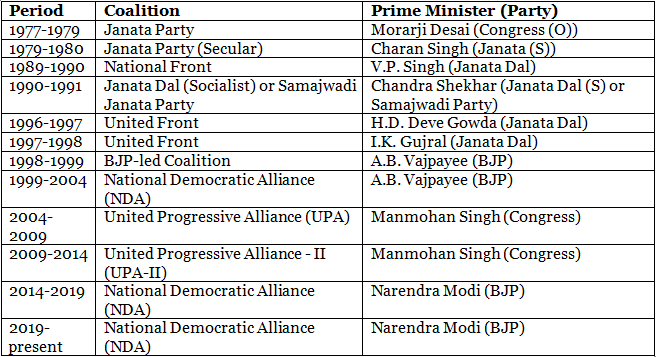Problems of Administration in Coalition Regimes | Public Administration Optional for UPSC (Notes) PDF Download
Maharashtra Political Crisis
The political landscape in Maharashtra has witnessed a fluid situation as veteran politician Eknath Shinde rebels against his party leadership and signals plans to align with the BJP. The ongoing Maharashtra political crisis has brought the Governor's constitutional authority to call for a floor test to the forefront. In response to petitions filed by dissident Shiv Sena MLA and Minister Eknath Shinde and 15 other members, the Supreme Court has issued notices to the Deputy Speaker and others involved in the disqualification processes. The stability of coalition governments becomes paramount in such situations.
What is Meant by Coalition Government?
The term "coalition" originates from the Latin word "coalitio," which means "to develop together." In politics, a coalition refers to an alliance formed by several political parties. A coalition government is established when these parties collaborate to form a unified administration. This type of government is created when no single party obtains a clear working majority after a General Election. Coalition governments play a crucial role in providing political legitimacy, resolving crises, and reducing internal strife.
Why are Coalition Governments Formed?
Coalition governments are often formed during periods of national difficulty or crisis to ensure a government with perceived political legitimacy and collective identity. They facilitate the accommodation of diverse interests and reduce political conflicts. In the absence of a clear majority for any party, coalition governments bring together multiple parties to create a functional government that represents a wider range of viewpoints.
Coalition Government in India: Background and Historical Context
- The decline of the Congress system, the rise of the Mandal issue, new economic reforms, the demolition of the Babri Masjid, and the assassination of Rajiv Gandhi were some of the key events that shaped the landscape of coalition politics in India.
- The dominance of the Congress party, which held a majority of 415 seats in the 1984 elections, came to an end in 1989. This marked the beginning of a multi-party system, where no single party secured a majority in elections until 2014.
- Alliance politics gained momentum during this era, with various parties representing Dalits, Other Backward Classes (OBCs), and regional interests. The United Front government in 1996 received support from the Congress, BJP, and left parties to keep different political forces out of power. The BJP emerged as the largest party in 1996 and formed a coalition government with Atal Bihari Vajpayee as the Prime Minister.
- This phase witnessed the political rise of the Other Backward Classes (OBCs) with the implementation of the Mandal Commission's recommendations. The commission suggested reservation policies to improve the conditions of OBCs in education and employment. The Mandal Commission's implementation led to significant political mobilization among OBC communities.
Features of Coalition Government in India
Coalition governments in India are characterized by negotiated agreements among the participating parties, which codify the cabinet's common goals and objectives. These agreements are often written by legislative party leaders. Coalition politics in India is dynamic, with alliances forming and dissolving over time. There are two types of coalitions: internal coalitions, which involve people working within an organization, and external coalitions, which bring together parties from outside the organization.
Advantages and Disadvantages of Coalition Government
Coalition governments offer several advantages, such as accommodating diverse interests, strengthening the federal fabric of the political system, promoting regional representation, and encouraging political consensus. However, they also face challenges, including potential instability, constraints on the Prime Minister's leadership, blame games among coalition partners, and the influence of smaller parties.
Reasons for the Growth of Coalition Politics in India
Coalition governments have grown in India due to various reasons. They allow political concerns to address regional realities and create policies with broad-based consensus. Unlike single-party administrations, coalition governments are compelled to discuss and formulate policies, leading to better economic outcomes. The historical record of coalition governments in India demonstrates their ability to balance political interests and economic stability.
History of Coalition Governments in India: Key Periods and Prime Ministers
Coalition governments have played a significant role in shaping India's political landscape. Here are the key periods and Prime Ministers associated with coalition governments:

Conclusion
Coalition governments have become a prominent feature of Indian politics, representing the diverse interests and aspirations of its citizens. While they may face challenges, coalition governments offer advantages such as accommodating multiple viewpoints, promoting regional representation, and encouraging consensus-based decision-making.
|
58 videos|242 docs
|
















